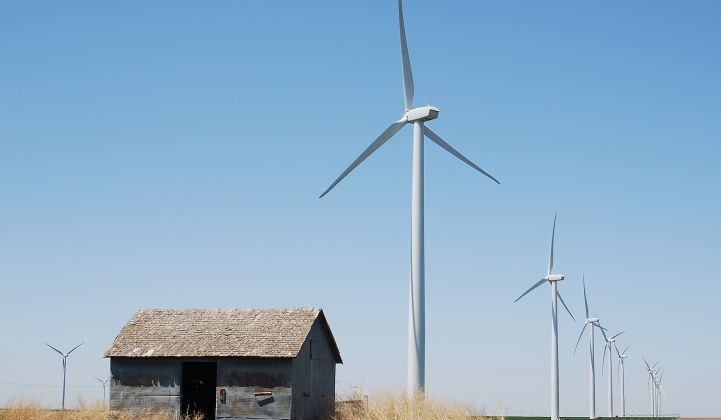When it comes to creating jobs and innovating in the energy sector, President Trump doesn't have to try very hard to make America great again.
Because renewable energy is already making it great, says a bipartisan group of governors. They can see it firsthand in their states.
A coalition of eight Republican governors and 12 Democratic governors sent a letter to the White House yesterday, asking Trump to "strengthen America's energy future" by extending government support for offshore wind, R&D, grid modernization and improved permitting for utility-scale renewables.
They pointed to the hundreds of thousands of jobs created in their states across the country -- from Arkansas to Kansas to California -- as evidence that renewables are providing a direct economic boost.
"Members of the Coalition have seen the benefits of renewable energy firsthand, and agree that expanding renewable energy production is one of the best ways to meet the country’s growing demand for energy," read the letter, which was signed by Sam Brownback, the Republican governor of Kansas, and Gina Raimondo, the Democratic governor of Rhode Island.
"For example, U.S. wind facilities pay rural landowners $222 million a year, with more than $156 million going to landowners in areas with below-average incomes. In addition, $100 billion has been invested by companies in low-income counties, where some 70 percent of the nation’s wind farms are located," wrote the governors.
The message from state officials to Trump is clear: If you want to live up to your promise of keeping industry in America, you can't ignore domestic renewables.
After all, wind and solar alone are already providing more jobs than coal, oil and natural-gas extraction combined in the U.S. And according to government figures, the solar industry now represents 43 percent of all jobs in the American electric power sector.
"Today’s wind and solar resources offer consumers nearly unlimited electric energy with no fuel costs, no national security impacts, and a number of environmental benefits. The boons of renewable energy can be virtually endless with your Administration’s and Congress’ support of the key initiatives detailed here," wrote the governors.
The coalition's requests are simple: The government should help modernize the grid, support basic research, and make it easier to build offshore wind projects.
Any infrastructure bill should include grid modernization to improve renewables integration, harden the electrical system and improve security, argued the governors.
"Across the country, electric utility customers are paying for investments in transmission and distribution system modernization. As the governors work with state utility commissions and the private sector to plan the best electric systems, it is vital that those investment decisions are based on the latest data, technology options and trends," they wrote.
The Department of Energy is already leading the way on this. The Trump administration could apply lessons from that work to any infrastructure plan it drafts. (It may already be doing so.)
The governors also called on Congress and the White House to increase R&D funding for renewables.
"New electricity distribution, storage, controls and end-use technologies are making possible increased resilience and decreased costs to improve economic competitiveness. [...] If the United States does not continue robust federal research and development programs in wind and solar energy, we will cede leadership in these critical technologies to other nations that have demonstrated ongoing high priority commitments to these technologies, such as China," they wrote.
Government labs and the country's energy innovation agency, ARPA-E, have long been leading the charge on next-generation energy tech. The White House and Congress wouldn't have to do much to ensure this work continues.
The governors also told the federal government to step up support for offshore wind, which is finally getting traction in the U.S. They asked Congress to extend the Investment Tax Credit for offshore wind in order to make financing easier, and called on agencies to continue streamlining project siting on federal land.
Renewables support on federal lands started under the George W. Bush administration and accelerated under the Obama administration. Trump has repeatedly talked about making energy development easier on federal lands. This is an easy place to start.
"An especially effective approach used by past Administrations to address permitting and siting issues is to direct assistant secretary level appointees from key agencies to meet quarterly and report on progress and remaining barriers. Consistent high-level attention, followed by White House questions, can deliver results," wrote the governors.
Conservatives and business leaders have been vocal about climate and energy since President Trump took office. Last week, a group of distinguished Republicans released a plan to tax carbon and encouraged fellow members of the GOP to get in front of the climate issue: "Such a plan could strengthen our economy, benefit working-class Americans, reduce regulations, protect our natural heritage and consolidate a new era of Republican leadership."
And shortly after Trump was elected, a group of hundreds of companies -- many of the biggest corporations in the world -- sent a strongly worded letter urging the then-president-elect not to ignore the clean energy transition.
"We want the U.S. economy to be energy-efficient and powered by low-carbon energy. Cost-effective and innovative solutions can help us achieve these objectives. Failure to build a low-carbon economy puts American prosperity at risk. But the right action now will create jobs and boost U.S. competitiveness," they wrote.



